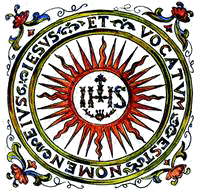
Doctor of the Church, Patron of Catechists
Feast Day: September 17
Born at Montepulciano, Italy, October 4, 1542, St. Robert Bellarmine was the third of ten children. His mother, Cinzia Cervini, a niece of Pope Marcellus II, was dedicated to almsgiving, prayer, meditation, fasting, and mortification of the body.
Robert entered the newly formed Society of Jesus in 1560 and after his ordination went on to teach at Louvain (1570-1576) where he became famous for his Latin sermons. In 1576, he was appointed to the chair of controversial theology at the Roman College, becoming Rector in 1592; he went on to become Provincial of Naples in 1594 and Cardinal in 1598.
This outstanding scholar and devoted servant of God defended the Apostolic See against the anti-clericals in Venice and against the political tenets of James I of England. He composed an exhaustive apologetic work against the prevailing heretics of his day. In the field of church-state relations, he took a position based on principles now regarded as fundamentally democratic - authority originates with God, but is vested in the people, who entrust it to fit rulers.
This saint was the spiritual father of St. Aloysius Gonzaga, helped St. Francis de Sales obtain formal approval of the Visitation Order, and in his prudence opposed severe action in the case of Galileo. He has left us a host of important writings, including works of devotion and instruction, as well as controversy. He died in 1621.
From Catholic Online.
His spirit of prayer, his singular delicacy of conscience and freedom from sin, his spirit of humility and poverty, together with the disinterestedness which he displayed as much under the cardinal's robes as under the Jesuit's gown, his lavish charity to the poor, and his devotedness to work, had combined to impress those who knew him intimately with the feeling that he was of the number of the saints. Accordingly, when he died there was a general expectation that his cause would be promptly introduced. And so it was, under Urban VIII in 1627, when he became entitled to the appellation of Venerable. But a technical obstacle, arising out of Urban VIII's own general legislation in regard to beatifications, required its prorogation at that time. Though it was reintroduced on several occasions (1675, 1714, 1752, and 1832), and though on each occasion the great preponderance of votes was in favour of the beatification, a successful issue came only after many years. This was partly because of the influential character of some of those who recorded adverse votes, Barbarigo, Casante, and Azzolino in 1675, and Passionei in 1752, but still more for reasons of political expediency, Bellarmine's name being closely associated with a doctrine of papal authority most obnoxious to the Regalist politicians of the French Court. "We have said", wrote Benedict XIV to Cardinal de Tencin, "in confidence to the General of the Jesuits that the delay of the Cause has come not from the petty matters laid to his charge by Cardinal Passionei, but from the sad circumstances of the times" (Études Religieuses, 15 April, 1896).
[Note: St. Robert Bellarmine was canonized by Pope Pius XI in 1930, and declared a Doctor of the Universal Church in 1931. He is the patron saint of catechists.]
From the Catholic Encyclopedia.




















No comments:
Post a Comment